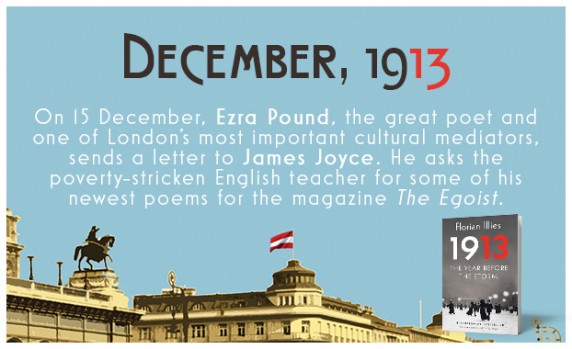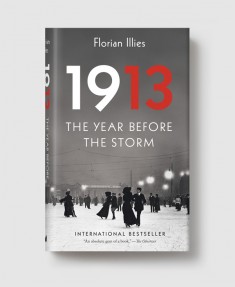December 17, 2013
This month in 1913: The Sorcerer’s Apprentice becomes The Magic Mountain, D.H. Lawrence’s blood is true, and the future is open
by Melville House

It was the year Henry Ford first put a conveyer belt in his car factory, and the year Louis Armstrong first picked up a trumpet. It was the year Charlie Chaplin signed his first movie contract, and Coco Chanel and Prada opened their first dress shops. It was the year Proust began his opus, Stravinsky wrote The Rite of Spring, and the first Armory Show in New York introduced the world to Picasso and the world of abstract art. It was the year the recreational drug now known as ecstasy was invented.
It was 1913, the year before the world plunged into the catastrophic darkness of World War I.
December 16, 1913-January 5, 1914
Date unknown: The December edition of the Neue Rundschau prints a short notice from Oscar Bie, who had recently visited Thomas Mann at his home: he reports that Mann is working on a new novel entitled The Sorcerer’s Apprentice. Bie’s handwriting was so indecipherable that even he sometimes had problems decoding it. So Thomas Mann ends up spending December putting straight all the friends and acquaintances who write to him about it: “You won’t believe it, but (the novel) is finished. And by the way, it’s called The Magic Mountain.”
December 24: Adolf Loos tries to visit the castle of the successor to the throne in Konopiště, next door to the Borutins’ castle. He writes a letter and asks to be allowed in. But Franz Ferdinand does not want to be disturbed. A shame, it would have been an interesting encounter: the two opposite poles of Austria-Hungary. Loos, the ice-cold adversary of ornament, and Franz Ferdinand, the hot-blooded commander in chief of the army.
December 25: D. H. Lawrence, who is enjoying his greatest success ever in England with Sons and Lovers, has already made the conflict between intellect and instinct into a big topic with this book. Back in the autumn, in an attempt to make his beloved Frieda von Richthofen believe him, he walked through the whole of Switzerland, and now the two of them are celebrating a warm Christmas in a dockside bar by the Mediterranean. That Christmas, Lawrence composes his very own confession of faith: “My great religion is a belief in the blood, the flesh, as being wiser than the intellect. We can go wrong in our minds. But what our blood feels and believes and says, is always true.”
Date unknown: In the dark December night Robert Musil takes notes from which his novel The Man Without Qualities will later grow. Now he writes the lovely sentence: “Ulrich predicted the future and had no idea.” Not bad. He takes another sip of red wine and lights a cigarette (or at least that is how one imagines it), then, writing as Ulrich, his protagonist, he turns his attention to the heroine, Diotima, the much-desired beauty, the Woman Full of Qualities; and all the time he had that particular sentence on his lips. So he writes: “And something was open: it was probably the future, but to some extent it was her lips too.”
